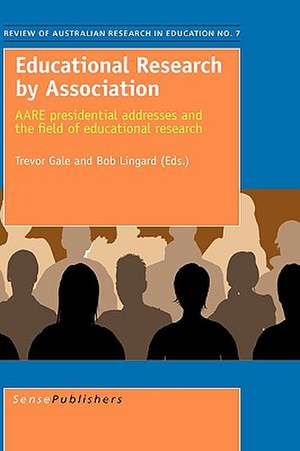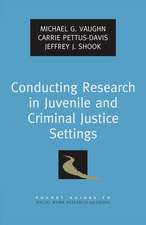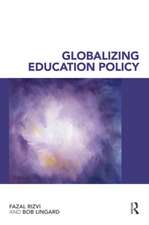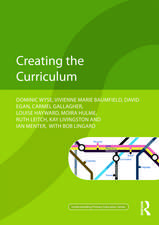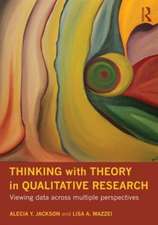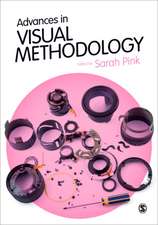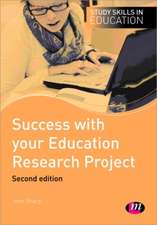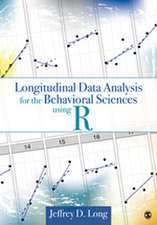Educational Research by Association
Editat de Trevor Gale, Bob Lingarden Limba Engleză Hardback – 23 noi 2009
| Toate formatele și edițiile | Preț | Express |
|---|---|---|
| Paperback (1) | 241.02 lei 38-44 zile | |
| Brill – 31 dec 2009 | 241.02 lei 38-44 zile | |
| Hardback (1) | 567.30 lei 38-44 zile | |
| Sense Publishers – 23 noi 2009 | 567.30 lei 38-44 zile |
Preț: 567.30 lei
Preț vechi: 700.38 lei
-19% Nou
Puncte Express: 851
Preț estimativ în valută:
108.57€ • 117.89$ • 91.20£
108.57€ • 117.89$ • 91.20£
Carte tipărită la comandă
Livrare economică 19-25 aprilie
Preluare comenzi: 021 569.72.76
Specificații
ISBN-13: 9789460910180
ISBN-10: 9460910181
Pagini: 210
Dimensiuni: 156 x 234 x 13 mm
Greutate: 0.47 kg
Editura: Sense Publishers
ISBN-10: 9460910181
Pagini: 210
Dimensiuni: 156 x 234 x 13 mm
Greutate: 0.47 kg
Editura: Sense Publishers
Descriere
Descriere de la o altă ediție sau format:
Educational Research by Association is an archive of an archive. It is a collection of eleven Presidential Addresses delivered over the last 40 years to the annual conference of the Australian Association for Research in Education (AARE) and published annually in AARE’s academic journal, the Australian Educational Researcher (AER). However, it is more than an archive in that the selection and the opening essay seek to plot, evaluate and contribute to definitions of education research and its functions and purposes in a changing world, and to consider its impact, broadly defined, in both actual and desirable or normative terms. In pursuing this agenda, the book highlights a number of key issues that have become important in educational research over time, particularly in Australia but also around the globe. These include defining education research as a field, including AARE’s location within that field and the positioning of the presidents’ Addresses therein. They also include questions about the purposes of education research, which implies as well the issue of the readership for such research. The selection also touches on matters of dissemination, publication and diffusion and impact more broadly, raising matters of publication and the various and competing outlets for publication of education research, nationally and increasingly on an international scale. Issues of quality, including associated politics, also come into play, as do questions of the relationship of education research to education policy and practice. These latter questions have become more significant in state policies framed by a new public management that call for evidence-based policy. The opening essay by Bob Lingard and Trevor Gale, two former AARE Presidents, traverses these matters generally and in respect of this archive of Presidential Addresses, helping to define educational research in an increasingly globalised world.
Educational Research by Association is an archive of an archive. It is a collection of eleven Presidential Addresses delivered over the last 40 years to the annual conference of the Australian Association for Research in Education (AARE) and published annually in AARE’s academic journal, the Australian Educational Researcher (AER). However, it is more than an archive in that the selection and the opening essay seek to plot, evaluate and contribute to definitions of education research and its functions and purposes in a changing world, and to consider its impact, broadly defined, in both actual and desirable or normative terms. In pursuing this agenda, the book highlights a number of key issues that have become important in educational research over time, particularly in Australia but also around the globe. These include defining education research as a field, including AARE’s location within that field and the positioning of the presidents’ Addresses therein. They also include questions about the purposes of education research, which implies as well the issue of the readership for such research. The selection also touches on matters of dissemination, publication and diffusion and impact more broadly, raising matters of publication and the various and competing outlets for publication of education research, nationally and increasingly on an international scale. Issues of quality, including associated politics, also come into play, as do questions of the relationship of education research to education policy and practice. These latter questions have become more significant in state policies framed by a new public management that call for evidence-based policy. The opening essay by Bob Lingard and Trevor Gale, two former AARE Presidents, traverses these matters generally and in respect of this archive of Presidential Addresses, helping to define educational research in an increasingly globalised world.
